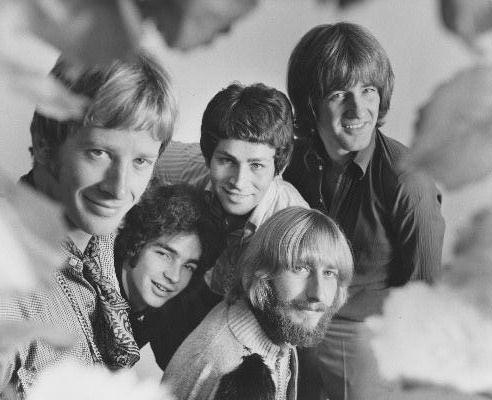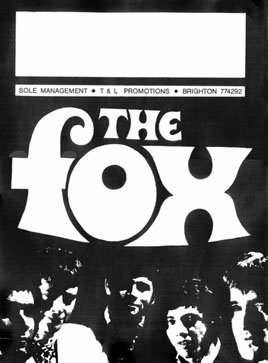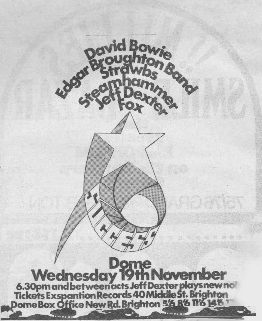


| The Fox (left to right) Steve Brayne, Tim Reeves, Alex Lane, Winston Weatherill, and Dave Windross |
THE FOX
INTERVIEW With just an album and a single to their name on Fontana Records in 1970, The Fox have have not been forgotten, their only album, "For Fox Sake" is collectable today and the group have become cult figures on the psychedelic market. For the first time, the story in full can be told. Andy Morten talks to Steve Brayne, guitarist and singer with the legendary UK pop-psych band. Steve, tell us about your first band The Beatroute was formed in late 1965 and lasted till 1966/67-ish, actual dates very vague. I wrote my first song when in this band and we used to do it live. Presumably you already knew the future members of The Fox Thats right. Alex (Lane), Tim (Reeves) and I were all at primary school together and Alex lived quite nearby. I met Nick (Apostiledes) for the first time when I saw The Alex Lane Group play. They were supporting the Small Faces in the days of "Whatcha Gonna Do About It?" They asked me to join when the Beatroute were doing a gig at the Art College. Their original singer had left but I decided not to at the time. They were very good but an out-and-out soul band and it didn't quite fit me at the time. Tim, Alex and Nick were all in the band but I didn't meet Dave Windross until The Fox got together. He'd played Hammond in another band called Omega Plus with Tim on drums and they used to do the American bases and toured in Germany and Sweden I think. Dave switched to bass when the Fox got together. He's got a good grasp of harmony and his bass playing was great.
So what did you do between playing with The Beatroute and The Fox? In 1968 I came
back to Brighton after having been away at college in
Bristol for a year. It had been the 'summer of love' and
I found I had been spending more time majoring in
psychedelia, growing my hair and playing the guitar than
doing any study, so I ended up dropping out. While I was
there I had got together with a couple of friends - a
good acoustic blues guitarist and a singer, Pete and
Martin, and we'd spent hours jamming and called ourselves
The Magic Theatre. A mix of blues and a touch of Pink
Floyd. When the students occupied the union building we
managed to borrow some electric guitars and amps from
Dave Arbus of East of Eden, who were a local band. They
didn't know us at all but that was the spirit of the
times. That's when I discovered feedback and a lot of
what we played sounded like the last few seconds of
"Madame Magical" but went on for a lot longer.
I don't know if it helped the students' cause but we
enjoyed it! Were you writing your own music at this point? I'd written a few songs before I went to Bristol like "Mr Blank", which I wrote when I had a period working in the corporation dustyard! "Glad I Could" is also from that time. I wrote a few in Bristol too, like "Butterfly" and "Madame Magical", both about the same girlfriend who was a very good singer-songwriter and guitarist herself. So when I got back to Brighton and bumped into my old mate Tim Reeves and he told me that he and Alex and Dave Windross and Nick Apostiledes were getting a band together and had some good songs, we agreed to all meet up.
I was listening to everything from Hendrix (particularly Axis: Bold as Love), The Doors, Blue Cheer, Country Joe & The Fish (Electric Music For Mind And Body), Pink Floyd (Piper At The Gates Of Dawn), The Beatles (Sgt Pepper, Magical Mystery Tour), Traffic (Mr Fantasy), Small Faces (Ogden’s Nut Gone Flake), MC5, Bert Jansch and John Renbourn (Bert & John), Dylan (John Wesley Harding), Leonard Cohen, The Rolling Stones (Their Satanic Majesties Request), Cream (Disraeli Gears), The Nice (The Thoughts Of Emerlist Davjack), The Soft Machine and last but not least good old John Mayall. Oh, and Wes Montgomery in my cooler moments. But let's not forget Procol Harum and Hapsash & The Coloured Coat. What a period that was! So what happened when you met up with the guys? Tim and I met in a
pub and he told me that he, Alex, Nick and Dave Windross
had got together with a bunch of songs ("Second Hand
Love", "Birthday Card") and were planning
to go professional as a band playing originals. I said I
had a few songs too ("Mr Blank", "Man In A
Fast Car", "Butterfly", "Glad I
Could", "Madame Magical") and that maybe
we should get together. We did - it clicked. What was your repertoire in those days? We started rehearsing in late summer 1968 and were doing our own material plus a song by The Idle Race (can't remember the title), a Vanilla Fudge (slowed down and heavy) style version of "Day Tripper", "Take Another Little Piece Of My Heart", "The Cat" (an instrumental by Jimmy Smith) used to be our stage intro, one or two R&B things - one was called "Sure Gonna Mess Him Up" (by who?) and so on. Mostly we played our own thing. What kind of venues did you play? Our first gig was
supporting The Herd on Brighton seafront and we gigged
round the local colleges, like the Art College and the
Polytechnic. A local agent called Mike Clayton (known to
The Mike Stuart Span as well!) got us a few gigs round
the southeast but he was more hot air than performance.
OK, Mike Clayton
was a local Brighton agent and he got a few gigs for the
band, mostly college gigs, supporting Juicy Lucy at the
Brighton College of Art, lots of gigs at the Poly and
various gigs around Sussex, Hampshire, Norfolk even, at
various clubs and corn exchanges! How did the recording of the album come about? An old girlfriend
of mine phoned from London to say she knew some guys with
a record company who were looking for acts and did I know
any good bands in Brighton. What could I say? So Patrick
Meehan and Adrian Miller came down to the pub we
rehearsed in, wearing sharp suits, driving a Rolls Royce
and flashing wads of money. We were naturally impressed.
They had a company called M & M Records who did lease
tape deals. We didn't know at that time that the Roller
was on hire, they were London management and that was
good enough for us.
We started at
about 6pm and finished about 7am, by which time we had
largely completed the album in a great rush of
adrenaline, enthusiasm, kebabs, nicotine and coffee. We
recorded live, including guitar and organ solos, and
overdubbed vocals. We had rehearsed hard for a year or so
and so we felt we could handle that OK and we just
ploughed through the numbers. With hindsight..? What were your opinions of the album? We all felt the
result could and should have been a lot better but we
were talked out of the re-recording option and told that
we would spend a lot more time on the second album. There
are still bits on the album that could have been sorted
out in the mix and we also felt that the mix in general
was too washy with reverb. There are also some bits of
the performance which aren't as good as we could have
made them. Everything was done in one, two or three
takes. How did the deal with Fontana come about? The deal with Fontana was negotiated by our management. It was a lease tape deal so all the recording was arranged by and paid for (maybe!) by them and then sold on to Fontana. Who thought of the title For Fox Sake? It certainly wasn't our idea! The management again. We thought it was a cheap shot and didn't reflect the way we felt about the band or the music. Let's face it, the album is hardly brimming with the rebellious sentiments the title suggests. However, over the years it has become a name which has caused a few laughs and people do remember it.
It was reviewed by Anne Nightingale very favourably in The Daily Sketch. We were her ‘band to watch for’ in 1970. She lived in Brighton and used to come to the gigs, she really liked the band. It was also reviewed by Jeremy Pascall in Honey magazine, again a good review. Melody Maker panned the single ("Second Hand Love/Butterfly") - thank you Chris Welch! I don't know about any other reviews apart from the Radio One new releases programme. There was also a big photographic session sometime with Dezo Hoffman who had done The Beatles, The Kinks and loads of others. How did the American release come about and why does the cover state Volume One? Again, the Meehans had some connection with Bob Crewe in the States and set up the deal. It was Volume One because there was to be a Volume Two. This was recorded but never completely finished and who knows where it is now. Pity. How did the album sell? No idea about sales I'm afraid. We would be the last to know about anything like that, never having had any figures. Did you continue to play live to promote the album? We played Hatchetts in Piccadilly about this time, and were booked to play the Plumpton Jazz and Blues Festival soon after the release date but by that time we had been forgotten about by the management because they had got hold of Black Sabbath. Late sixties psych-folk-rock was out and HEAVY was in. Did The Fox do any radio or TV shows? Perhaps the best thing we did was a session for Radio One which went out on the Stevie Merrick (?) breakfast show and was repeated on Radio One Club. The BBC engineers did a great job, the band played brilliantly, much better than on the album and we thought it sounded great but it is now totally lost -aaaaagh! It would be great to think that some collector somewhere had recorded it and that it might just turn up one day. Did Meehan and Miller do anything to help? They were totally involved with Black Sabbath by then, and had already given us a string of broken promises about buying us new gear (we were half way to London in a van to pick it up, when we were told to turn back because the paperwork wasn't ready), about buying a van for the band (we got the van, but the cheque bounced and it had to be returned), about the "test recording", about the forthcoming US tour and other such crap, David and Winston decided they'd had enough and left a couple of weeks before Plumpton. There wasn't enough time to get replacements and I guess the rest of us were equally despondent, besides, we thought we had the best musicians locally anyway and we were a bunch of mates. So I guess you could say we promoted the new album by breaking up! A novel approach and one to which we owe our lasting aura of mystery and obscurity. What did the band members do next? After all that, I
decided to turn my back on the music industry but carry
on playing and writing. Any final thoughts? The Fox was a great band, which we were all committed to. It was a labour of love and a great exciting project for us. We slaved over the songs and arrangements and loved each other’s playing. Live, we were loud and righteous and better than we sound on the album, but the music business we saw was full of shit, lies and deceit. It killed the music. This is not a new story and no doubt continues today - another wreck on rock's highway! How do you feel about the album’s reputation among 60’s music fans today? I'm delighted with
any interest that there is today in our music and the
enthusiasm you have shown. It's great to know that
something survived after all the effort. |
| FOR FOX SAKE |
|
The Fox's lone album is
essential and worthy of any record collection. Originally
released on Fontana Records in 1970, the album is an
work of art with some great haunting guitar work and
hammond organ. All the songs included here are expertly
crafted pop with enough experimentation, psychedelia, and
intelligence to make it worth your while and if the works
on this album are anything to go by then, they must have
been a great live act. FOR FOX SAKE TO BE RE-ISSUED!!! At last, the Fox album is to be re-issued, go HERE for more details |
 |
 |
| Early Photo shot | The Fox in support to David Bowie |
| Special thanks to Steve Brayne and Andy Morten for the time and patience in getting this page set-up, much appreciated |